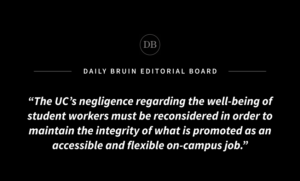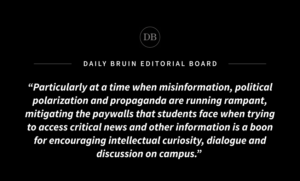This post was updated Nov. 27 at 7:20 p.m.
UCLA has the best university dining program in the country.
But myriad complications have challenged that claim, with adverse consequences for both students and dining staff.
The most recent issues affecting on-campus dining have been tied to UCLA’s new mobile ordering system, which was introduced last year in a limited capacity.
Last month, however, mobile ordering became mandatory for eating at many of The Hill’s dining establishments. For instance, the kiosks at The Study at Hedrick were completely removed. Students now order on the Transact Mobile Ordering app ahead of time and come to pick up their food when they are notified.
In theory, this is a great system that limits crowding, but in practice, the results have been unimpressive, to say the least.
Students have reported wait times of up to 90 minutes for meal orders at many dining halls, forcing some to skip meals entirely or try to plan far in advance to get food. On top of that, there has been additional strain placed on an already understaffed UCLA Dining workforce with reports of large backups in the system, a high volume of orders and alleged problems with the mobile ordering algorithms.
Despite the positive intentions behind the mobile ordering system, it’s clear that UCLA Dining must reassess the role of mobile ordering in light of the stark repercussions of its implementation on campus.
From the start of this year, the system’s faults have been clear. In September, ordering on Transact Mobile was temporarily suspended after the high level of orders led to server outages.
Even when the servers are operational, however, reports of incorrect pickup times on the app and other technical issues have made it exceedingly difficult for students to navigate what was supposed to be a helpful tool in reducing crowding and wait times.
While students complain of inefficiency, dining hall workers have also struggled to adapt to the new system. Mobile orders all have unique ID numbers, but workers must match food to the proper order, ultimately complicating the process due to the massive amount of orders that are sent in every day.
On social media, dining hall workers have made anonymous posts expressing their dissatisfaction with the new system and their place on the front lines facing angry and desperate student diners. One post described an incident where a student allegedly yelled at workers at The Study over a late order.
Unfortunately, the pervasive harassment of service workers at the hands of customers remains systemic even at UCLA. But it’s clear that the deficiencies of mobile ordering have made dining hall workers a target for some students frustrated with a system that workers cannot control.
If neither students nor dining workers seem to benefit from mobile ordering, who exactly, then, is this program for?
There are a few upsides to the new system, to be sure, but they do not outweigh the cons.
The mobile ordering system limits crowding in takeout dining spots on campus by a significant amount. Students who were on The Hill last year likely remember how packed places like The Study and Rendezvous could get at peak dining times.
When working properly, the new system can also be more convenient. Ordering ahead of time allows students to plan their meals throughout the day such that minimal time is wasted waiting for food. However, this benefits students only when they are proactive enough to remember when to order food and how much time to allocate for their order.
This is another double-edged sword: While students can and have been using the Transact Mobile app to order their food ahead of time, prepared food can often be seen sitting at the collection well beyond the time they were finished. If not done properly, a situation like this contributes to the immense backup of orders that workers experience routinely as a result of the new system.
While there are some positives, the new system creates more problems than it solves.
If UCLA wishes to maintain its reputation for having the best food among national universities, it will have to seriously re-evaluate its dining operations.
Everyone can agree – no one wants a hungry Bruin.






Comments are closed.